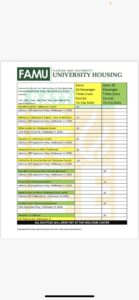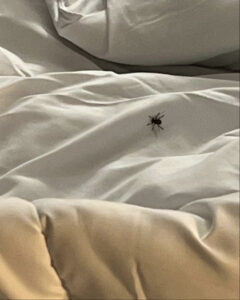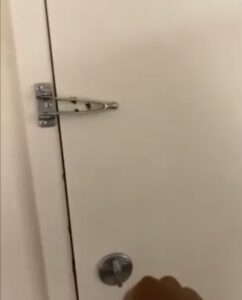
Students at Florida A&M University are taking hit after hit at the hands of the housing department.
A flood spanning four floors in the Polkinghorne Village West residence hall, forced 128 students to be evacuated. This incident arose just two days after it was announced Palmetto Phase III residents must relocate to local hotels due to pest infestation in the dorm rooms.
According to the housing department, the flood was caused due to a minor fire that activated sprinklers. Out of 128 students impacted by this situation, 48 were directly impacted by the water damage. Students waited outside the dormitory for almost two hours with no knowledge of the situation at hand. Shortly after they were allowed back into their rooms, resident assistants informed them they would need to pack their belongings and evacuate the premises immediately.
Micah Barkley, a junior broadcast journalism student, was irritated with the sudden change of plans.
“They literally gave us two hours to move out,” Barkley said. “At 7:03 p.m., they sent the email that we need to have our stuff packed and leave by 9 p.m.”
Environmental Health and Safety assessed the dorms shortly after and provided recommendations on what to keep or dispose of based on their expertise. A trailer was made available at the entrance for students to dispose of any damaged belongings. Housing has also provided a general liability form and encouraged those affected to submit photographic evidence, which will be provided to the risk management office.

Residents of both affected dorms were provided temporary housing at local hotels as an alternative. Many students have turned to social media to address the state of their living conditions.
Sydney DeMar, an out-of-state freshman impacted by the infestation, expressed her disappointment in the management of the situation via Instagram.
“The school is not in communication with the hotels according to the hotel staff,” DeMar said. “When I arrived, the door was already open, the room smelled like trash, one bed had used flat pillows and the other bed didn’t have any pillows at all. The room had used cups in the bathroom, full trash bins, and dirty floors. This is beyond the automated ‘We apologize for the inconvenience’. This is unacceptable and I am embarrassed for the university.”
Robyn Mobley, a first-year pre-nursing student, was distressed upon relocating to her hotel.
“It’s a stressful situation, especially as a freshman,” Mobley said. “I felt unsafe the first night. The lock on the door is broken and the room is not up to par.”
Three days after the fall semester began, Phase III residents learned they would be relocated temporarily, from an Instagram post made by the housing department’s account. Within an hour of the post being taken down, almost 300 students were emailed midday that they would have 24 hours to vacate the campus. This sudden mandate was due to myriad complaints of pests, such as roaches, in rooms.
University Housing Director Jennifer Wilder said this decision was made in the best interests of the students after speaking with their exterminating company.
“This was the course of action that they recommended,” Wilder said. “This was not an undertaking we took lightly. It’s inconvenient and we understand that. But had there been some other option that we thought worked, we would have chosen that.”

While the displaced students spend a week-long stay in their hotels, the apartments will be cleaned, assessed, and baited with a final walkthrough midweek. University Housing anticipates the return of students affected by Thursday, Sept.1.
Housing has employed Astro Tours while using the campus’ Venom shuttle to transport students. Three shuttles in total split the routes among the hotels, with Astro Tours running hourly and Venom running every two hours.
Many students took to social media to complain about their tardiness due to the shuttle schedule. However, FAMU officials will not be providing excused absences to those affected. Students are encouraged to speak directly to their professors about their situation.
Alumni and students alike have expressed extreme concern with housing’s management. In July, news broke that the department did not have enough space on campus to accommodate incoming freshmen. This caused a student housing crisis that affected the city of Tallahassee itself. According to University Housing, 230 of 506 students have applied for assistance and found housing for the school year. Many are still looking for available housing or have returned home with no luck.